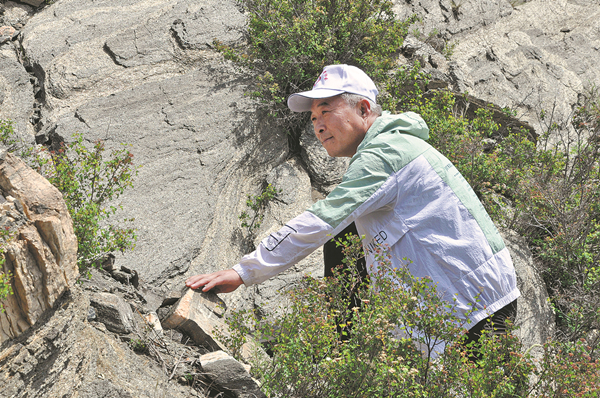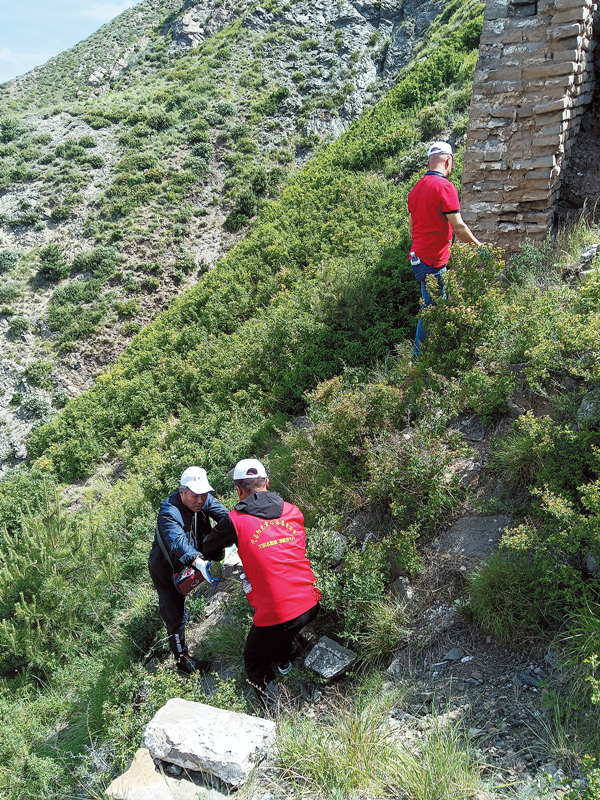Man's efforts to protect Great Wall paying off
Updated: 2023-11-27

Yuan Xuerui collects garbage during his patrol of the Great Wall in Daixian county, Shanxi province. [Photo provided to China Daily]
From voluntarily collecting historical materials related to the section of the Great Wall in his Shanxi province hometown to becoming an official cultural heritage protector, Yuan Xuerui has spent over two decades safeguarding the ancient fortification.
China's Great Wall is one of the great wonders of the world and also a UNESCO World Heritage Site. Built from 3 BC to the 1800s on the northern fringes of the country to defend successive Chinese empires, the Great Wall has a total length of more than 20,000 kilometers.
Yuan, 54, was born in Qingxibao at the foot of the ancient wall in Shanxi's Daixian county, which is part of the city of Xinzhou.
The county is home to more than 48 km of the Great Wall, including sections built during the Northern Qi Dynasty (550-577) and the Ming Dynasty (1368-1644), according to the county government.
Yuan grew up hearing stories about the ancient wall. He especially loved stories about Yanmen Pass, an important opening in its inner line.
Yanmen Pass – wild goose gate in Chinese – got its name from wild geese that can be seen flying nearby during their annual migration.
Situated at a place of strategic importance, Yanmen was regarded as the most important among the nine passes under heaven in ancient times.
Yuan's love for the ancient wall motivated him to protect it, and when not engaged in farm work, he spent most of his time walking along the wall to collect bricks that had fallen off due to the ravages of time and prepare for repairs. "What others perceive as a difficult and dull task of cultural heritage preservation often brings me unexpected discoveries," Yuan said.
He officially became a cultural heritage worker in 2018, and his duties have since expanded from collecting bricks to organizing ancient documents related to the wall to better tell stories about it.
He has now gathered more than 500,000 words worth of materials related to the Great Wall, as well as the culture and history of Daixian county.
As a heritage worker, Yuan has come to understand the profound meaning of the Great Wall.
For example, each brick has endured the test of time over hundreds of years – in some cases more than a thousand – carrying rich historical memories, he said.
Yuan also learned that repairs of the Great Wall must adhere to the principles of "repairing it as it was".
"Only by using original bricks to repair and restore it can the ancient and rustic essence of the Great Wall be preserved and its historic significance upheld," he said.

Yuan (left) and other villagers collect fallen bricks from the Great Wall for future repairs during a patrol. [Photo provided to China Daily]
This summer, Yuan organized a campaign to call for people to collect bricks for the future repair of the wall.
Many bricks were taken away from the Great Wall by local villagers to build their houses in the 1960s and 1970s.
As villagers' awareness of the need to protect the wall has grown, they are replacing the bricks and saving them for future repairs of the wall, he said.
In late 2019, the central authorities publicized plans for the construction and preservation of national cultural parks based on the Great Wall, with one such park to be built in Shanxi.
"The construction of the cultural park has strengthened local people's awareness to protect the Great Wall as the ancient wall has become a project that will bring income to every local person," Yuan said, adding that many tourists now flock to the county to see the ancient fortifications.
"Nowadays, when local residents find fallen bricks along the Great Wall, they will pick them up," he said.
"If they see garbage, they will also pick it up and throw it into bins."
The cultural park would promote the county's overall development in fields ranging from the economic and social to the cultural and ecological, Yuan said.
"Cultural heritage carries history, and cutting off history is like a family losing its roots. That's why we need to protect cultural heritage," he said.



